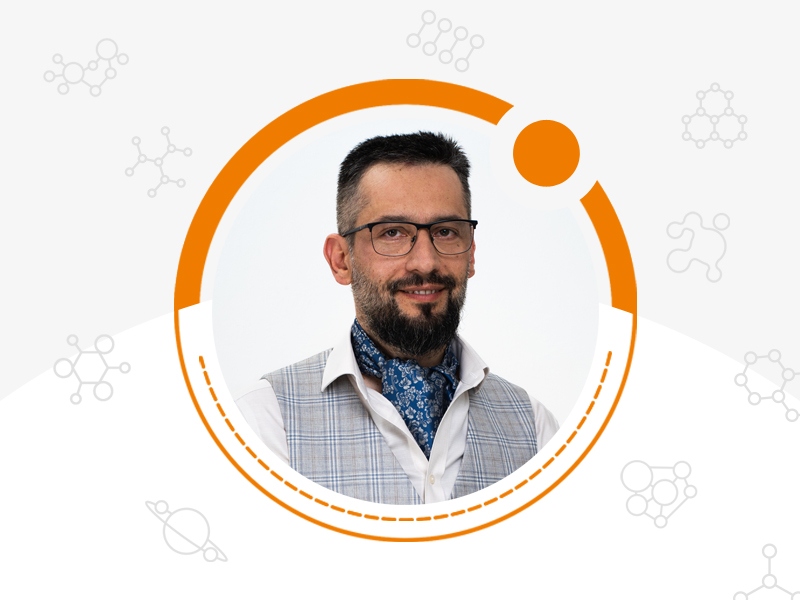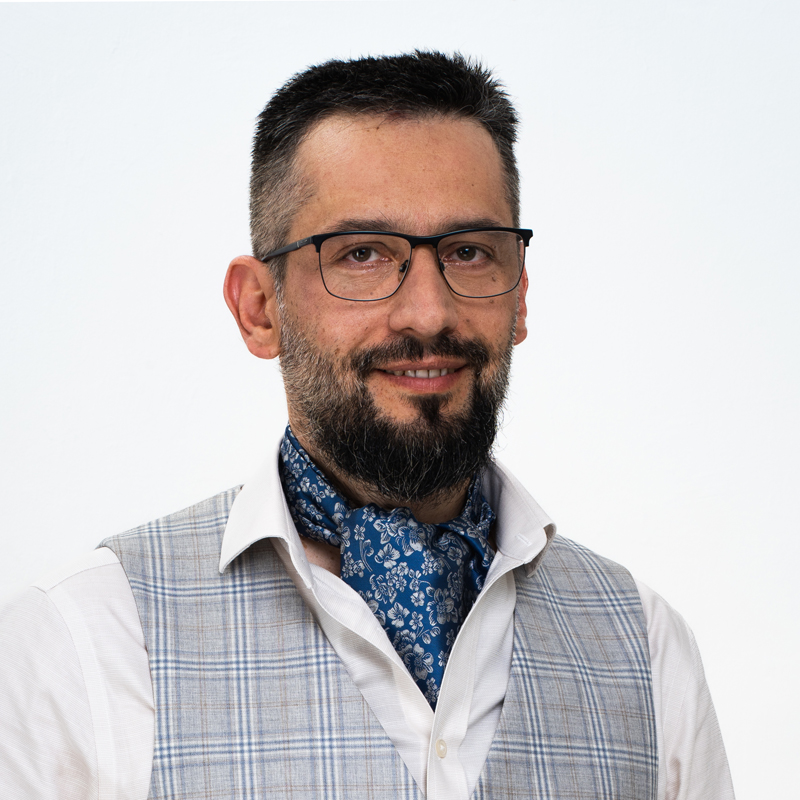
November
MALE CANCER AWARENESS MONTH

Dear men, boys – take care of all your gear – not only the ones in the garage. The importance of cancer prevention is discussed by Prof. Robert Musioł from the Institute of Chemistry.
Woman, Girl – support!
Be sure to read!
„Save the date” is a series of articles that have been written to celebrate various unusual holidays. The authors of the presented materials are students, doctoral students and employees of the Faculty of Science and Technology of the University of Silesia.
photo: University of Silesia
prof. ROBERT MUSIOŁ
Institute of Chemistry
show publications
Science | My Passion
Save the Date – Valentine’s Day
Save the Date – Book Lovers Day
The first step of victory is courage
We always say that medicine works wonders. However, in real life it is not supernatural interventions, but rather a lucky coincidence that stays behind most miraculous cures. One of the most important factors that can influence the course of treatment and prognosis is time. Efficient diagnosis and early detection are words repeated like a mantra, especially by oncologists. A quick decision to see a doctor and an equally quick diagnosis usually affect the entire course of treatment, and often determine the patient’s life. In our Polish reality of poorly managed and underfunded health care, patient’s awareness plays an especially important role. Therefore, for the motto of today’s text, I have chosen the words of Plutarch of Cheronea, an outstanding Greek writer and historian. Although written during the life of Themistocles (Lives of Famous Men) almost two thousand years ago, this sentence should still be our guiding principle in preventive health care. It still happens that, due to fear and uncertainty, we prefer to delay decisions, pretend in front of ourselves and our loved ones that everything is fine, that we feel good, and that we can only see doctors on the screen. Out of fear of what we can discover, we consciously give up this knowledge (and, a little less consciously – our health, and sometimes even life).
Oddly enough, this problem applies even more to men, who, at least historically, were considered the epitome of courage. Meanwhile, it is men who more than twice come to the doctor too late. They much more often explain their sluggishness with shyness and embarrassment. Certainly, the reasons for this state of affairs can be found in various places, not only in the fragile hearts of today’s men. First of all, the social awareness of female diseases is much greater today. And that’s great! Convincing our ladies not to be afraid of mammography and to get their Pap smears checked frequently was a huge endeavor that cost us millions. Although the situation is still far from ideal today, it is money very well spent. Meanwhile, men prefer to pretend, because admitting weakness seems to be the most difficult thing that can happen to them.
It turns out, however, that bad luck has a whole repertoire of bad things for us, and when it comes to taking care of health – gentlemen, we should show much more courage. Thus, November became the month of male courage: for several years it has been promoted as part of the Movember campaign – as a month of awareness of male health problems: mainly prostate and testicular cancer. The name is a compouding of words moustache and November, and the symbol is, of course, a moustache. The incentive to grow a moustache is intended to create male solidarity and raise interest in health and support for spreading knowledge on the subject. While Plutarch, quoted a moment ago, said that a beard doesn’t make anyone a philosopher, I believe that health care should not be a great philosophy. Unfortunately, it turns out that the level of knowledge on men’s matters in society is frighteningly low. A recent study shows that nearly half of men, and slightly fewer women, believe that the prostate is found in both sexes. Most often, however, it is identified more with a disease, not an organ, hence most men perceive information about it as an announcement of imminent death. They don’t pay attention to the initial, easy to overlook symptoms, and they don’t know anything about possible tests (or they are afraid of them). This is a probable reason why prostate cancer is the second most frequently detected type of cancer in the world responsible for nearly 35,000 deaths annually. In other words, nearly 100 men a day die from prostate cancer. At the same time, early detection increases the chances of recovery by more than 90%. So you can see that the Movember initiative is by all means right, and gentlemen should take things in hands.
So, starting from the basics, it is also worth reminding what this mysterious prostate is. prostate gland is something that every man has – also fully healthy. It is a gland that is found only in men and is responsible for important functions of their reproductive system. It is located just below the bladder, around the urethra, acting as a kind of three-way valve of the male urogenital system. This small gland (sometimes compared to a chestnut or a walnut) is responsible for secretion and emitting the fluid in which the sperm is suspended. When it works properly, we are not even aware of its presence – who would think about some glands in such moments? However, with age, it very often becomes enlarged – it is called a benign hyperplasia, or (not very correctly) hypertrophy. Then it can cause pressure on the urethra and typical problems that older men often deal with (frequent visits to the toilet, problems with urination, discomfort). Over time, it can lead to more serious dysfunctions in the entire “male plumbing”. However, this doesn’t mean a tragedy or cancer, and most often it doesn’t require more serious medical interventions. Observation, possibly assisted by medication, is an excellent remedy – but you need to see a doctor. Prostate cancer has very similar symptoms, insidiously developing unnoticed, while benign prostatic hyperplasia occurs with age in most men. Therefore, constant observation and regular medical control are the most important ways to protect against cancer. It just so happens that due to its location (under the bladder, next to the end of the gastrointestinal tract), the examination of the prostate is most often performed from the back, in a way that men do not like, and are often even afraid. Admittedly, it is difficult to find pleasure in any medical procedures – after all, that’s not what they serve. But, to be afraid of one, small finger? it’s not manly. It is worth remembering that there are other, less troublesome methods of examining the condition of the prostate, for example by measuring the level of specific prostate antigens (PSA) in the blood. Men over 40 have free access to these tests as part of the “40+ prevention” programme. Although the Ministry of Health, guided by its own, specific understanding of the concept of prevention, takes into account a one-off test package, and the continuation of the programme in the following years is questionable, the cost of such a test is small compared to the potential benefits. So gentlemen: in November, we grow a moustache, roll up our shirt sleeves and go to the blood donation points. Real tough guys should boldly take off their pants.
Another major problem affecting the uglier part of society is testicular cancer. It is even more dangerous that, although much rarer, it occurs much earlier. Naturally, men of every age can get ill, but the most often it is diagnosed in patients between 20 and 35 years old. The vast majority of men of this age are considered, ironically, immortal, and visiting doctors seems a peculiar pastime reserved for the beneficiaries of the “fourteenth pension pay”. It’s totally unlikely that any guy under fourty would admit that there is “something wrong”. That’s why testicular tumours are usually only detected when they metastasize. In a statistically (and dramatically) typical situation, a young man decides to see a doctor because of a persistent cough, pain in his back or abdomen. It is only after a long conversation that it comes to light that he previously ignored or hid the symptoms noticed in his pants. Today’s problems are precisely the result of metastasis, as testicular cancer most often spreads to the lungs, bones or brain. What is worse, such tumours develop very dynamically and sometimes it is a matter of weeks that determine the effectiveness of treatment and prognosis. If they are detected at an early stage, chance of full recovery is almost 100%.
Fear and shyness kill! That’s why sometimes we have to take matters in our hands and check our jewels. In case of any abnormalities, especially pain, hypersensitivity, sensation of a foreign body or weight, especially surface tumours and swelling, go to the doctor as soon as possible, without false modesty.
By the way, since we are talking about prevention and awareness, it is worth explaining how you can protect yourself against prostate or testicular cancer. After all, prevention is always better than cure. However, it is not always possible, especially that some cancers do not have any clear risk factors or are not yet sufficiently understood. Admittedly, quitting smoking and cutting on alcohol significantly reduces the risk of developing many diseases, not just lung cancer. Then what about male cancers? In fact, there is some correlation between health-related decisions and a decrease in the risk of developing prostate and testicular cancer. However, it is too small to make an excuse in the form of purchasing a gym pass. There are no clear-cut risk factors in this case, unless we include… being a male.
Sometimes it’s just a bad luck – and it can concern each of us. At best, we can foster or oppose this bad luck with our lifestyle, but it cannot be eliminated. That is why awareness and self-control of your health condition is so important. The recently published results of research conducted on a group of over 32,000 men are of particular importance. It turns out that sexual activity is an effective prophylaxis that can reduce the risk of prostate cancer. Although the mechanism of this phenomenon has not been fully understood, studies clearly show that men who have sex more than every other day can reduce the risk of cancer by over 30%.
In the light of these revelations, at the end of today’s “Save the Date”, I chose words of another eminent figure of the ancient world, namely a Ramon poet, Ovid, who noticed that “Venus favours the bold”.






